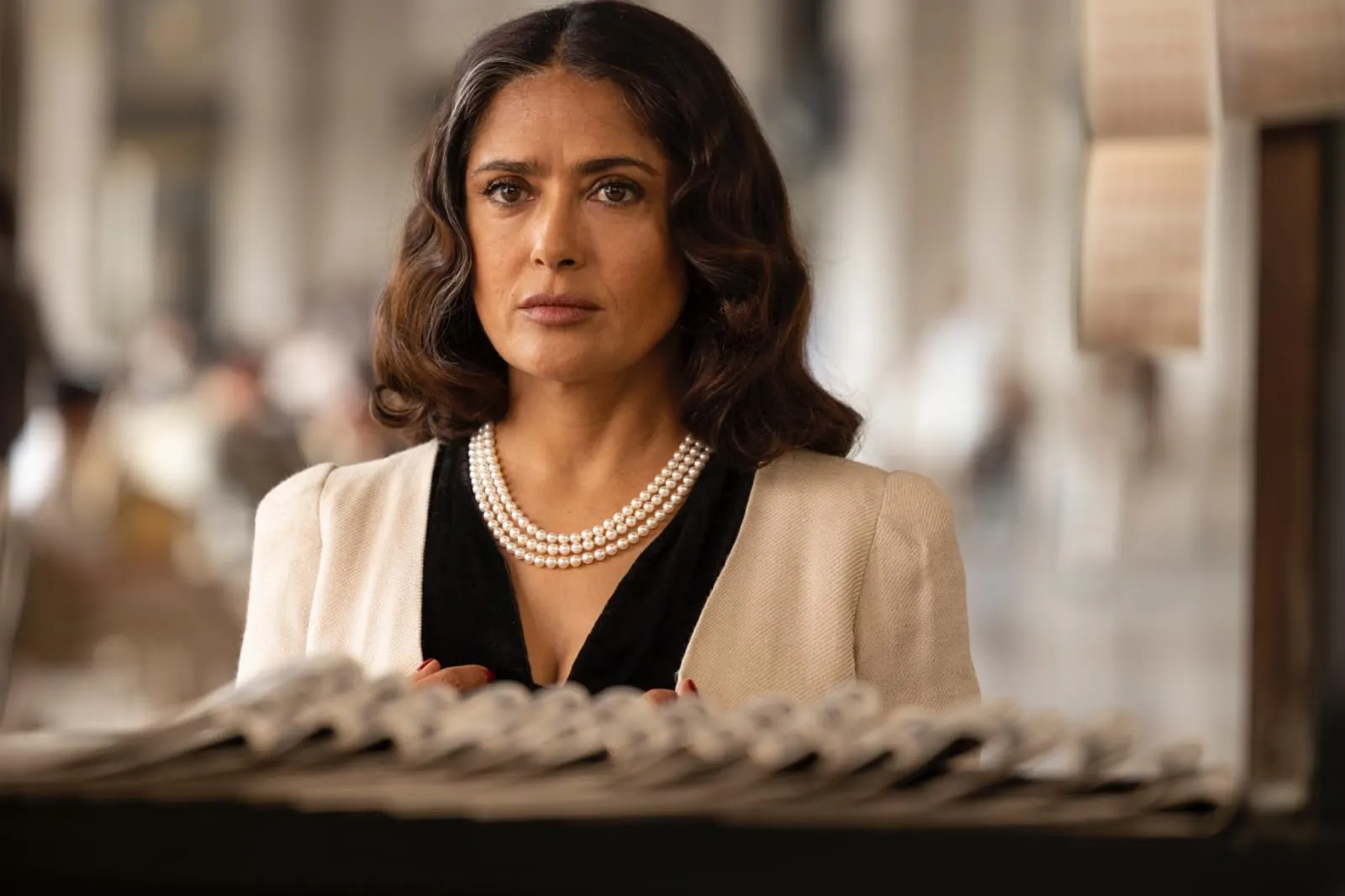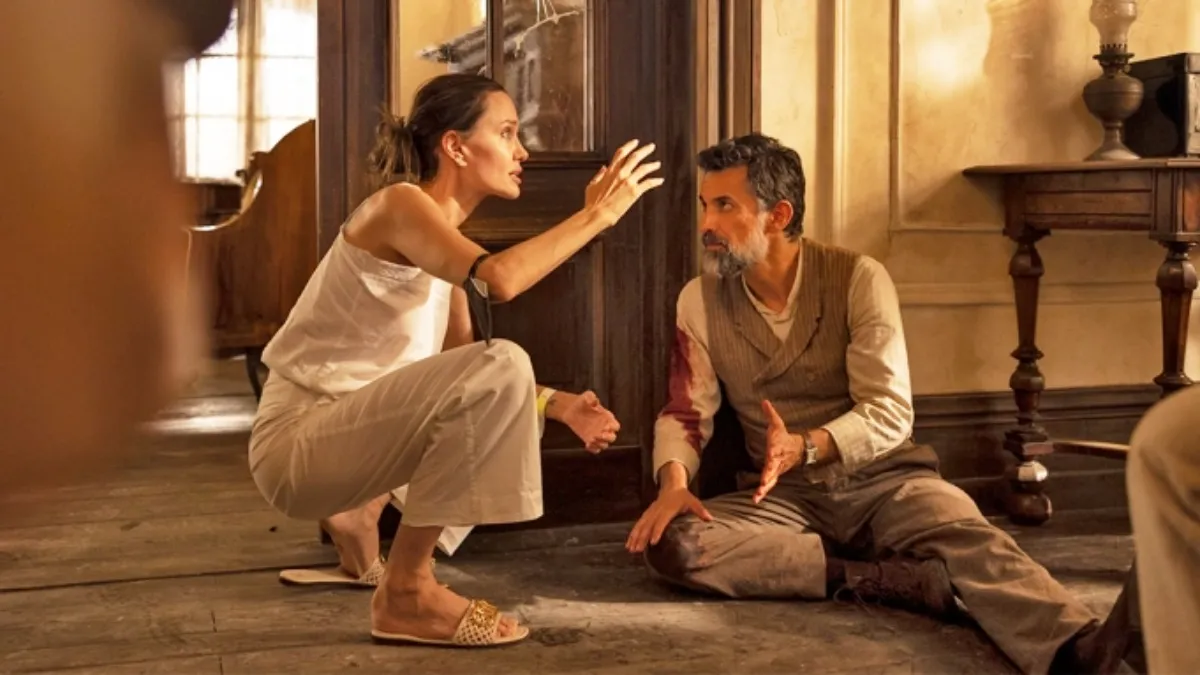War’s wounds have ways of festering that aren’t always visible on the surface. In her fifth feature as director, Angelina Jolie adapts Alessandro Baricco’s novel Without Blood to examine how conflict’s impacts can reverberate through lives even long after the fighting stops. We meet Nina, a woman still carrying deep scars from a brutal attack in her youth. Decades later, she seeks out Tito, one of the men responsible. Rather than retaliation, Nina wants discussion.
Jolie’s film centers their difficult conversation as the pair pick at memories of the disturbing incident that altered both their paths. Nina and Tito try making sense of that day’s violence and its lasting effects. But with trauma come fractured recollections, and getting at the truth involves peeling through layers of shadowy recalls. As an actress-turned-director, Jolie shows a passion for stirring dialogues that grapple with war’s heavy realities. Her adaptation honors the source material’s aim to start a thoughtful exchange, not simply present answers.
Though not without flaws, Without Blood sets an admirable stage. It gifts time and space for its characters to work through painful topics, inviting viewers to listen closely and reflect alongside them. An impactful film is one that creates further discussions long after credits roll. On that front, Jolie’s work here is off to a promising start.
The Weight of Memory
This story centers around a disturbing incident from Nina’s past that forever altered the course of her life. As a young girl, she could only hide and watch in horror as three men broke into her home. They mercilessly took the lives of her father and brother, leaving Nina the sole survivor of the attack.
Now, many years later, Nina seeks out one of the men responsible, Tito. Rather than revenge, she wishes to speak with the person who was there that fateful day. The film plays out their discussion at a small cafe, where Nina and Tito exchange recollections of the tragic event and its aftermath.
Both characters are deeply scarred by their experiences. Nina carries the trauma of losing her family in such a violent manner at a young age. Tito lives with the guilt of his own involvement in the killings. Their differing retellings show how memory can become distorted over time. The film introduces flashbacks to illustrate their recollections, but this disrupts the natural flow of conversation.
Meanwhile, Nina and Tito navigate complicated emotions. Nina shows resilience despite immense suffering, while Tito presents a detached facade masking his true anguish. Through subtle gestures and silences, the talented stars Salma Hayek and Demián Bichir bring these complex individuals to life. However, the characters remain somewhat surface-level overall due to story constraints.
The true heart of the film lies in Nina and Tito’s exchange as they work to make sense of the incomprehensible act that changed everything for them both so long ago. Through their discussion, Angelina Jolie’s film explores how violence can forever scar both victims and perpetrators alike.
The Subtleties of Trauma
Jolie aimed to honor the source material’s ambiguity by setting Without Blood in a hazy atmosphere. She blended influences from Westerns and film noir, crafting a space where the aftereffects of conflict could roam freely. But the film sorely lacks specific contexts to anchor these abstract spaces. Viewers are left grasping for purchase points.
Jolie visualizes trauma’s impact on memory through interspersed flashbacks that illustrate Nina and Tito’s fragmented recollections. But these halt the conversation’s flow. The technique reveals intention, though falls short in execution. Flashbacks offer little visually besides torture scenes shown too repetitively to retain power.
Some flourishes prove more fruitful. An opening ride captures a hellishness Jolie lets linger, conveying violence’s lasting hold. Sweeping landscape shots breathe life into the parched setting. But in leaning too heavily on tight close-ups between characters, she risks distancing audiences from their journey.
Bolder experiments with composition or narrative risks could have wrung more from weighty themes. Yet Jolie displays care in deconstructing how trauma warps memory. Her pursuit of subtlety proves a double-edged sword—bbringing audiences near darkness’ complexities but keeping them at arm’s length in others. Ambition and abstraction occasionally clash at the cost of clarity.
Without Blood flashes thoughtful intent, but direction falls short of fully delivering its ambitious dive into conflicts’ complex aftermaths. Jolie shows care for difficult subjects, though visuals require braver choices to match her earnest goals.
Beyond the Surface
Without Blood aims to delve into how conflict has long shadows and violence begets yet more harm. Through Nina and Tito’s exchange, we glimpse differing views on such weighty topics. Tito believes his past actions were for a greater good, but Nina argues violence solves nothing, only continuing the cycle of hurt.
Their discussion tries to shed light on truth’s murkiness post-war and humanity obscured amid fights. But without real-world roots, the film struggles to anchor such complex notions. The characters talk in vaguer terms, never digging below surface understandings.
Some moments do tap into thorny issues profoundly. We see trauma embedded in Nina’s every action and recognize shared pains beneath her accusations of Tito. But overall, the film manages only fleeting glimpses at topics crying out for deeper inspection.
Had the film surrounded Nina and Tito with fuller context, maybe their viewpoints would feel less abstract. We could better walk in their footsteps and comprehend conflicts’ intricate legacies. As is, their conversation introduces many fruitful themes yet keeps viewers at an unsatisfying distance.
Potential existed to probe real human impacts with bracing intimacy. Instead, heavier topics float by with room left for richer involvement. Jolie eyes thoughtful subject matter, even if her film doesn’t wholly commit to peeling back its layers.
Bringing Depth to Difficult Dialogue
Without Blood stands on the talented shoulders, carrying its weighty dialogue. Salma Hayek and Demián Bichir breathe fullness into characters who, on paper, risked remaining surface-level. They engage viewers in Nina and Tito’s troubled talk through the subtlest of facial shifts and moments of quiet reflection.
Hayek portrays trauma embedding every gesture. From pensive lip bites to eyes brimming with unshed tears, her performance ensures Nina’s painful past remains palpably felt. Meantime, Bichir navigates Tito’s muddied morality with grating innocence cracking bit by bit. Both embody a mutual understanding between two souls forever marked by shared violence.
Even when discussion dances near superficial, these accomplished stars anchor scenes with nuanced emotionality. They imbue vacant stares and fleeting glances with senses of detachment, anger, and reconciliation woven throughout two scarred lives. Their chemistry sparks glimmers of hope that trauma need not divide but can cultivate empathy.
Through minimalist mastery, Salma Hayek and Demián Bichir elevate material that, on the page, offered shallower fare. Theirs are performances spanning entire spectra without single misstep, consistently engaging where the film itself risks coming unstuck. Their talents breathe life through Without Blood’s heavy dialogue, beginning important debates that will echo long after end credits fade.
Missed Opportunity Amid Noble Aspirations
Jolie’s goals with Without Blood were undoubtedly laudable. Few topics demand discussion more than conflict’s complex remnants. However, ambitions faced compromising constraints from thin source material and reluctance to take bolder strides.
The film introduces affecting angles on its characters’ intertwined trauma. Yet ideas feel loosely scattered without a centered narrative to bind them. Generational impacts of violence and truth’s fractures under duress deserve focused dissection, not surface skimming.
With braver risks embracing specificity over abstraction, the film may have woven compelling intimacy from aloof backstories. As is, conversations capturing trauma’s depths feel stifled by format rather than fully unleashing their contemplative potential.
Regrettably, then, moments evoking emotion or crafting imagery haunting in their brevity comprise highlights of a feature failing to gel disparate components. Jolie grasped worthy subject matter, even if inconsistently executing on its magnitude.
Without Blood retains vision for stirring dialogues, as its namesake implies, even if this outing spreads thin what demands thorough excavation. Its director continues pushing boundaries; hopefully future risks match topics’ weight to impactful effect. For now, it represents a noble yet partial step.
An Uneven Yet Notable Effort
Without Blood is undoubtedly aimed high in grappling with conflict’s complex toll. But lofty goals faced challenges aligning disparate pieces into a cohesive whole. The film spreads thoughtful issues too thin at times. Nonetheless, certain parts resonate with haunting power.
Standouts come through Salma Hayek and Demián Bichir’s raw portraits of trauma navigated with subtle care. Jolie also shows a keen eye for evocative imagery when luminous landscape shots transport viewers alongside the characters. These attributes keep Without Blood compelling where its structure sometimes stumbles.
As a director passionate about confronting injustice, Jolie perennially tackles topics demanding brave representations. While this film falls short of fully realizing its timely subject, taking narrative risks could strengthen future probes into profound human truths. Her commitment to such important themes remains commendable.
Overall, Without Blood represents a partially realized effort with heartfelt intentions. But through committed performances and flashes of visual poetry, it offers glimpses at complex issues too rarely raised. And in aiming high, the film maintains hope that Jolie’s future directorial works may feel braver formally to match her earnest goals.
The Review
Without Blood
While Angelina Jolie's Without Blood introduces worthy subjects, its ambitions exceed its inconsistent execution. Nuanced themes are spread too thin, and a lack of narrative cohesion prevents full exploration of its poignant examination of conflict's personal toll. However, raw performances by Salma Hayek and Demián Bichir sustain engagement, hinting at the impact possible with braver formal risks matching this director's thoughtful intentions.
PROS
- Committed performances by Hayek and Bichir that elevate material
- Highlights important themes of war's lingering impacts
- Visual flair in isolated sequences like landscapes and openings
- Authentic evocation of trauma's subtleties
CONS
- Source material constraints of thin plot and lack of specifics
- Uneven direction that spreads themes too thinly
- Disjoints narrative flow with frequent flashbacks
- Fails to fully realize the potential depth of its topics



















































Discussion about this post